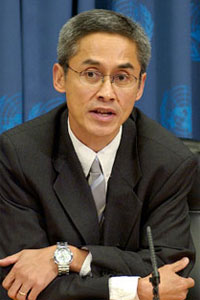
The past couple of months have seen two global developments sending strong messages against discrimination and exclusion. On Jan 13, the UN General Assembly adopted by consensus a key resolution against denial of the Holocaust, advocating stronger action against such a refutation on an international level.
A couple of months earlier on Dec 3, the UN's Committee on the Elimination of Racial Discrimination (Cerd) issued a set of recommendations targeting Thailand in a bid to improve the country's record on this controversial issue.
However effective follow-up measures are needed, involving both the public and private sectors, especially with some online platforms or forums becoming hotbeds for xenophobia, discrimination and intolerance.
With regard to the Holocaust, there is ample evidence showing that 6 million Jews perished under a systematic Nazi policy both before and during the Second World War. Killings of other groups, such as minorities and LGBTI people, also took place, adding to the horrific numbers of heinous crimes perpetrated at that time.
There are, and have been, many global and national court cases related to this, such as the trials and convictions of Nazi leaders at Nuremburg just after World War II, and myriad witnesses have spoken out. The evidence confirming the mass extermination of Jews and other vulnerable populations is irrefutable.
So why is the world now facing another round of Holocaust denial? It is partly due to misinformation and disinformation -- the "fake news" phenomenon that has been creeping up on us in recent years, compounded by the advance of technology and digitalisation and led by extremist and racist platforms. Neo-Nazi elements have cropped up, fuelled by groups and beliefs antithetical to human rights and democracy.
Last month's resolution by the General Assembly is thus a timely call for effective measures to counter Holocaust denial. These include educational programmes aimed at preventing future attempts at genocide. The call to states and the private sector, particularly social media companies, is to combat anti-semitism through distorted information and facilitate better reporting on the issue.
The resolution notes the importance of the international treaty adopted just after World War II to propel states to prohibit genocide. The Convention on the Prevention and Punishment of the Crime of Genocide came into existence in 1948 but is still awaiting ratification by some Asean members and other regions.
How do those developments resonate in Thailand? The country is not yet a party to the Genocide Convention but it needs to be, as this would provide an impetus for better education and other measures to prevent genocide. Notably, genocide also includes cruel acts, deprivation of basic necessities like food (starvation), abducting children from their families, and prevention of births.
However, genocide is a group-targeted crime that requires specific intent to be proved against a national, ethnical, racial and/or religious group. Thailand would also need to include genocide as a specific crime in our criminal law.
Pending membership of this convention, a lot can still make sure the painful lessons of the Holocaust are not lost. Some educational institutions already teach this part of world history but it can be improved in more animated forms both in and beyond classrooms, and more actively on the internet.
Memorialisation, such as in the form of materials presented in museums, is another means of reaching out to the public. Effective, multimodal presentations which stimulate people's interest, understanding, remembrance and empathy are encouraged. With regard to social networks, it is important for platforms to take down xenophobic and related materials, bearing in mind international standards on freedom of expression and permissible limitations.
Meanwhile, the Cerd Committee considered Thailand's record in terms of eliminating racial discrimination and issued a 10-page set of recommendations for the country to follow-up. It called upon the country to adopt a specific law against discrimination based on colour, caste and national origin. The committee also advised the country to criminalise racial hate speech and educate the public.
A longstanding anomaly involves racial profiling through SIM cards, facial recognition and DNA samples, affecting southern Thailand in particular. The committee called for review of related laws, especially the State of Emergency Decree and Martial Law.
The committee also raised the issue of protecting human rights defenders in the country. Thailand still has to properly handle a number of court cases against these freedom fighters -- a matter that is constraining civic space. These cases are known collectively as Strategic Litigation against Public Participation (SLAPP).
Interestingly, Thailand has been invited to revisit its understanding and recognition of "indigenous peoples". Local authorities tend to adopt the view that only Thai people are indigenous. However, the committee expressed "concern about the reports of direct and indirect, multiple and intersecting forms of discrimination faced by ethnic and ethno-religious groups and indigenous peoples including, among others, the Isaan, Karen, Lahu, Malayu Thais, Mani, Moken, and Urak Lawoi peoples".
Finally, there is another key issue permeating the country: who writes the history of our peoples? There is the underlying challenge of historiography which is to penetrate the veil of "who" documents history and "how" it is taught, especially when it is monofocal. The documenting and teaching of history, whether national or international, requires a variety of sources of evidence-based information.
It also calls for an openness in discourse and discussion to ensure that unsubstantiated news and rumours are not accepted as established facts, and that propaganda is not mistaken for genuine knowledge or education.
A diversity of credible sources and critical analysis grounded in a solid democratic space are thus a welcome tonic against indoctrination.
Vitit Muntarbhorn is a Professor Emeritus at the Faculty of Law, Chulalongkorn University. He has helped the United Nations as UN Special Rapporteur, Independent Expert and a member of UN Commissions of Inquiry on human rights.
